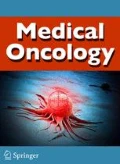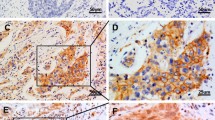Abstract
The goal of this study was to evaluate the expression of MUC1 in stage IB non-small cell lung cancer (NSCLC) and its prognostic significance. The expression of MUC1 in 178 NSCLC specimens was evaluated via immunohistochemistry. A reproducible semiquantitative method which took both staining percentage and intensity into account was applied for immunohistochemical scoring, and receiver operating characteristic curve analysis was utilized to select the cut-off score for high or low MUC1 expression. Then, the correlations between MUC1 expression and clinicopathological features and its prognostic relevance were determined. In this study, high MUC1 expression was detected more frequently in adenocarcinomas (86.3%) and other NSCLCs (74.1%) than in squamous cell carcinomas (39.1%, P < 0.001). The Kaplan–Meier survival curves showed that up-regulated expression of MUC1 indicated poorer overall survival (OS) and disease-free survival (DFS) (P = 0.011 and P = 0.008, respectively), especially for those with non-squamous cell carcinomas (P = 0.033 and P = 0.011, respectively). Multivariate analysis also confirmed that MUC1 expression was an independent prognostic factor for both OS and DFS in stage IB NSCLC (P = 0.008 and P = 0.004, respectively). MUC1 might be correlated with the histogenesis of lung adenocarcinoma, and its elevated expression may be an adverse prognostic indicator for the patients with stages IB NSCLC, particularly for those with non-squamous cell carcinomas.




Similar content being viewed by others
References
Jemal A, et al. Cancer statistics, 2009. CA Cancer J Clin. 2009;59:225–49.
Strauss GM, et al. Adjuvant paclitaxel plus carboplatin compared with observation in stage ib non-small-cell lung cancer: Calgb 9633 with the cancer and leukemia group b, radiation therapy oncology group, and north central cancer treatment group study groups. J Clin Oncol. 2008;26:5043–51.
Zeng W, et al. Hepatocellular carcinomas in cirrhotic and noncirrhotic human livers share angiogenic characteristics. Ann Surg Oncol. 2010;17:1564–71.
Patton S, Gendler SJ, Spicer AP. The epithelial mucin, muc1, of milk, mammary gland and other tissues. Biochim Biophys Acta. 1995;1241:407–23.
Guddo F, et al. Muc1 (episialin) expression in non-small cell lung cancer is independent of egfr and c-erbb-2 expression and correlates with poor survival in node positive patients. J Clin Pathol. 1998;51:667–71.
Guddo F, et al. Depolarized expression of episialin (ema, muc1) in lung adenocarcinoma is associated with tumor progression. Anticancer Res. 1998;18:1915–20.
Wesseling J, van der Valk SW, Hilkens J. A mechanism for inhibition of e-cadherin-mediated cell-cell adhesion by the membrane-associated mucin episialin/muc1. Mol Biol Cell. 1996;7:565–77.
Wesseling J, van der Valk SW, Vos HL, Sonnenberg A, Hilkens J. Episialin (muc1) overexpression inhibits integrin-mediated cell adhesion to extracellular matrix components. J Cell Biol. 1995;129:255–65.
Pandey P, Kharbanda S, Kufe D. Association of the df3/muc1 breast cancer antigen with grb2 and the sos/ras exchange protein. Cancer Res. 1995;55:4000–3.
Li Y, et al. The epidermal growth factor receptor regulates interaction of the human df3/muc1 carcinoma antigen with c-src and beta-catenin. J Biol Chem. 2001;276:35239–42.
Ren J, Li Y, Kufe D. Protein kinase c delta regulates function of the df3/muc1 carcinoma antigen in beta-catenin signaling. J Biol Chem. 2002;277:17616–22.
Khodarev N, et al. Cooperativity of the muc1 oncoprotein and stat1 pathway in poor prognosis human breast cancer. Oncogene. 2010;29:920–9.
Fessler SP, Wotkowicz MT, Mahanta SK, Bamdad C. Muc1* is a determinant of trastuzumab (herceptin) resistance in breast cancer cells. Breast Cancer Res Treat. 2009;118:113–24.
Piessen G, et al. Clinical impact of muc1 and muc4 expression in barrett-associated oesophageal adenocarcinoma. J Clin Pathol. 2009;62:1144–6.
Levi E, Klimstra DS, Andea A, Basturk O, Adsay NV. Muc1 and muc2 in pancreatic neoplasia. J Clin Pathol. 2004;57:456–62.
Baldus SE, et al. Muc1 and nuclear beta-catenin are coexpressed at the invasion front of colorectal carcinomas and are both correlated with tumor prognosis. Clin Cancer Res. 2004;10:2790–6.
Medina M, et al. Human colon adenocarcinomas express a muc1-associated novel carbohydrate epitope on core mucin glycans defined by a monoclonal antibody (a10) raised against murine ehrlich tumor cells. Cancer Res. 1999;59:1061–70.
Wang RQ, Fang DC. Alterations of muc1 and muc3 expression in gastric carcinoma: Relevance to patient clinicopathological features. J Clin Pathol. 2003;56:378–84.
Obermair A, et al. Expression of muc1 splice variants in benign and malignant ovarian tumours. Int J Cancer. 2002;100:166–71.
Rassidakis GZ, et al. Prognostic significance of muc-1 expression in systemic anaplastic large cell lymphoma. Clin Cancer Res. 2003;9:2213–20.
Awaya H, Takeshima Y, Yamasaki M, Inai K. Expression of muc1, muc2, muc5ac, and muc6 in atypical adenomatous hyperplasia, bronchioloalveolar carcinoma, adenocarcinoma with mixed subtypes, and mucinous bronchioloalveolar carcinoma of the lung. Am J Clin Pathol. 2004;121:644–53.
Nagai S, et al. A novel classification of muc1 expression is correlated with tumor differentiation and postoperative prognosis in non-small cell lung cancer. J Thorac Oncol. 2006;1:46–51.
Jarrard JA, et al. Muc1 is a novel marker for the type ii pneumocyte lineage during lung carcinogenesis. Cancer Res. 1998;58:5582–9.
Zhu ZH, et al. Three immunomarker support vector machines-based prognostic classifiers for stage ib non-small-cell lung cancer. J Clin Oncol. 2009;27:1091–9.
Hanley JA. Receiver operating characteristic (roc) methodology: the state of the art. Crit Rev Diagn Imag. 1989;29:307–35.
Zlobec I, Steele R, Terracciano L, Jass JR, Lugli A. Selecting immunohistochemical cut-off scores for novel biomarkers of progression and survival in colorectal cancer. J Clin Pathol. 2007;60:1112–6.
Woenckhaus M, et al. Prognostic value of fhit, ctnnb1, and muc1 expression in non-small cell lung cancer. Hum Pathol. 2008;39:126–36.
Ohgami A, et al. Muc1 mucin mrna expression in stage i lung adenocarcinoma and its association with early recurrence. Ann Thorac Surg. 1999;67:810–4.
Giatromanolaki A, et al. Coexpression of muc1 glycoprotein with multiple angiogenic factors in non-small cell lung cancer suggests coactivation of angiogenic and migration pathways. Clin Cancer Res. 2000;6:1917–21.
Tsutsumida H, et al. Combined status of muc1 mucin and surfactant apoprotein a expression can predict the outcome of patients with small-size lung adenocarcinoma. Histopathology. 2004;44:147–55.
Salaun B, et al. Cd208/dendritic cell-lysosomal associated membrane protein is a marker of normal and transformed type ii pneumocytes. Am J Pathol. 2004;164:861–71.
Ueno T, Linder S, Elmberger G. Aspartic proteinase napsin is a useful marker for diagnosis of primary lung adenocarcinoma. Br J Cancer. 2003;88:1229–33.
Gendler SJ. Muc1, the renaissance molecule. J Mammary Gland Biol Neoplasia. 2001;6:339–53.
Author information
Authors and Affiliations
Corresponding author
Additional information
Dongrong Situ, Jian Wang and Yun Ma contributed equally to this article.
Rights and permissions
About this article
Cite this article
Situ, D., Wang, J., Ma, Y. et al. Expression and prognostic relevance of MUC1 in stage IB non-small cell lung cancer. Med Oncol 28 (Suppl 1), 596–604 (2011). https://doi.org/10.1007/s12032-010-9752-4
Received:
Accepted:
Published:
Issue Date:
DOI: https://doi.org/10.1007/s12032-010-9752-4




